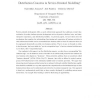Free Online Productivity Tools
i2Speak
i2Symbol
i2OCR
iTex2Img
iWeb2Print
iWeb2Shot
i2Type
iPdf2Split
iPdf2Merge
i2Bopomofo
i2Arabic
i2Style
i2Image
i2PDF
iLatex2Rtf
Sci2ools
135
click to vote
IJIPT
2006
2006
Distribution concerns in service-oriented modelling
Service-oriented development offers a novel architectural approach that addresses crucial characteristics of modern business process development such as dynamic evolution, intra- and interenterprise cooperation, and distribution/mobility. In previous papers, we have shown how the mechanisms that regulate the relationships, functioning and cooperation of business activities in such architectural models can be externalised from business rules in terms of connectors that can be superposed dynamically on stable core business entities. That is to say, we focused on what, in the literature, has been called the "service composition layer" of service-oriented architectures or, for short, their "composition logic". Our emphasis in this paper is on the distribution aspects: we show how a corresponding "distribution logic" can be defined in terms of another set of architectural primitives that address the way business rules depend on "locations". These pri...
Related Content
| Added | 12 Dec 2010 |
| Updated | 12 Dec 2010 |
| Type | Journal |
| Year | 2006 |
| Where | IJIPT |
| Authors | Nasreddine Aoumeur, José Luiz Fiadeiro, Cristóvão Oliveira |
Comments (0)

